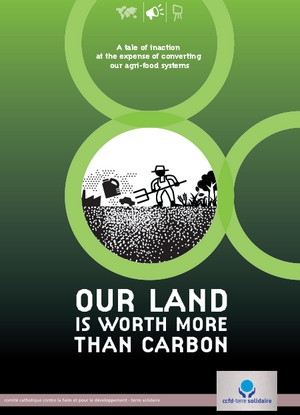
A tale of inaction at the expense of converting our agri-food systems. A CCFD-Terre solidaire policy paper, May 2018 (available in EN/ES/FR)
While farming is one of humanity’s activities that generates most greenhouse gas, carbon sequestration in farmland is increasingly put forward as a means of limiting climate change. Internationally, initiatives of this type combining state and private entities are mushrooming. Is this a miracle solution or an excuse for not reducing farm-related emissions ?
In this report CCFD-Terre Solidaire, analyses in detail carbon sequestration in soil and the complicated linkage between agriculture and climate change. It examines our agri-food systems both upstream and downstream from production and looks at the challenges in the light of environmental, economic, social and cultural criteria.
Above all, it shows that before introducing carbon sequestration mechanisms, we need to encourage farming in rich countries to move towards transitioning their agri-food systems. Industrialized food systems that rely heavily on chemical inputs produce too much greenhouse gas. Alternative systems exist but are being developed too slowly because of insufficient political support.
CCFD-Terre solidaire is CIDSE’s French member organisation.
Contact: Anne Laure Sablé, Food Sovereignty and Climate Advocacy Officer, CCFD Terre-Solidaire (a.sable[at]ccfd.terresolidaire.org)
EN-Our land is worth more than carbon
FR-Nos terres valent plus que du carbone
ES-Nuestras tierras valen más que el cárbono
